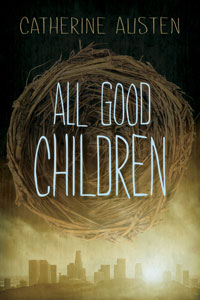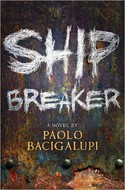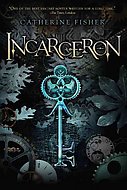 Austen, Catherine. All Good Children. Custer, Wash.: Orca Book Publishers, 2011. Print.
Austen, Catherine. All Good Children. Custer, Wash.: Orca Book Publishers, 2011. Print.[Book cover credit: http://catherineausten.com/books_agc.html]
Booktalk:
We've gone too far treating children like they're precious when actually there are billions of them in the world and most of them are good for nothing.Yikes, right?
p.97*
In a future not far from our own, Max is struggling to maintain his independence while everyone under the age of 18 is turning into some kind of zombie. The scary, do-what-you're-told kind, not the fun, brain-eating kind. They're being changed in the hope is that this program, called NESTing, will make sure that no child is "good for nothing." They will all be good doing what they're told.
Review:
All Good Children is a great book. The world that Austen has created really is a whole lot like ours could be in, oh, 50 years (or less). The majority of the population is desperately poor and living in cars they cannot afford to fuel. The (what we now call) middle class minority works in some capacity with the booming elder care industry. Everyone has an RIG that connects them constantly to entertainment, work, communication, whatever (ie, it's what iPad aspires to be). A chemical spill has created a whole region's worth of people born with physical deformities...that compete on a reality TV show. The cities are dangerous places, and everyone has moved to gated communities (actual communities rather than housing developments) for their own safety. That they've given up a whole host of civil liberties in exchange for that safety bothers almost none of them. They even give up the right to know what vaccinations are being administered in their children's schools and why their children suddenly have no discernible personalities. It's cool though, because they're just so darn well-behaved.
Max is not well-behaved. He never has been, and if he has anything to do with it, he never will be. He, along with his best friend Dallas, struggle to maintain their own thoughts and personalities while pretending to be perfectly "good children." Their struggle was awful, but their friendship was great.
The fact that Max's mom is Black and his father was white is not a constant issue, but it is an important one. In their own community, it is a non-issue (or it's supposed to be), but outside is another story. Without the visual aid of their father, Max's mom is always eyed with suspicion while traveling with Max and his sister Ally.
This is a really plot-driven book, which makes it hard to review; I don't want to give too much away.
Though it is published by Orca, it is not technically a hi-lo (high interest, low reading level). It's appropriate in both areas of measurement for the 12 and up set. It is, however, about a couple high school seniors and could be used as reading material for the same. I think it will be great for reluctant readers and dystopian lovers alike.
All Good Children comes out in in hardback in October!
Book source: ARC provided by the publisher through the LibraryThing Early Reviewers program.
*Quotes and page numbers are from an uncorrected proof and may not match the published copy.
Links to Amazon.com may be affiliate links for the Amazon Associates program. If you buy something through this link, I may receive a referral fee.





